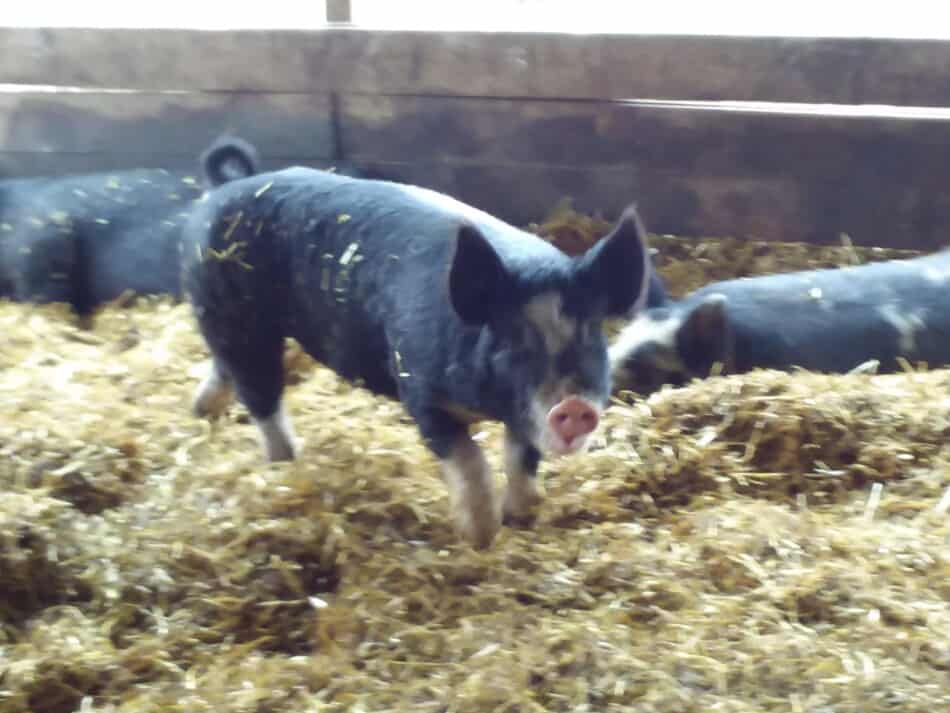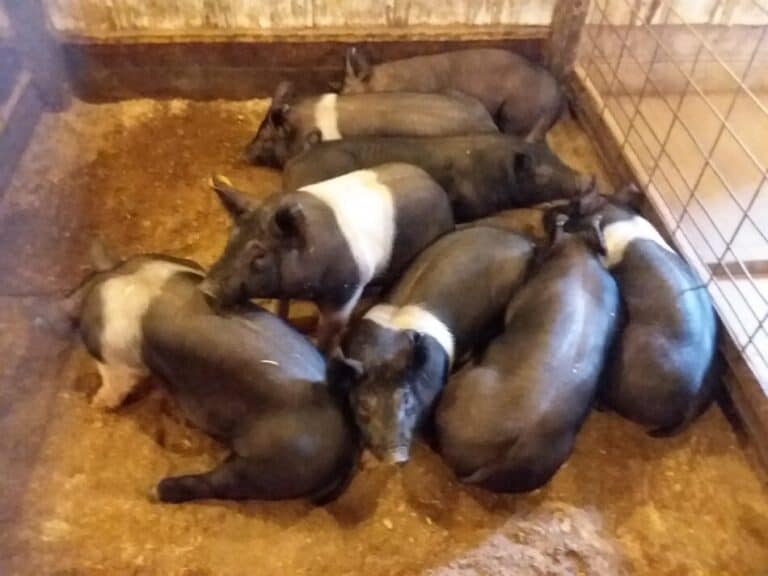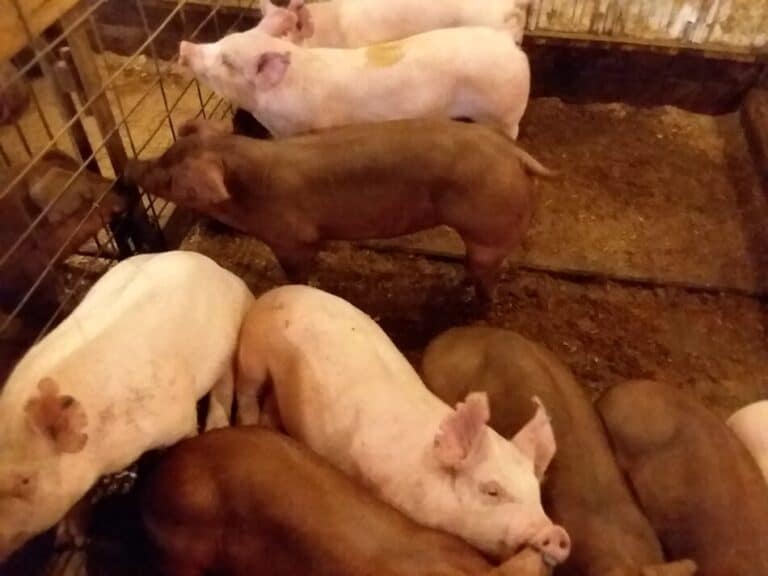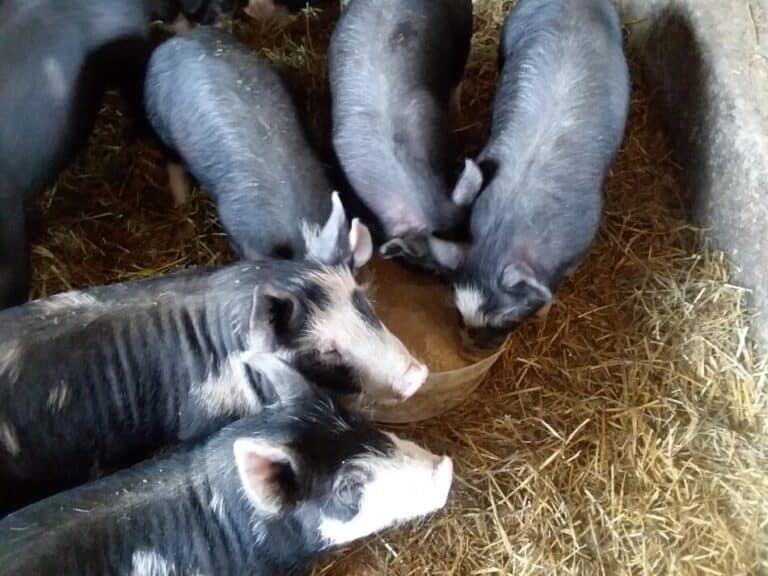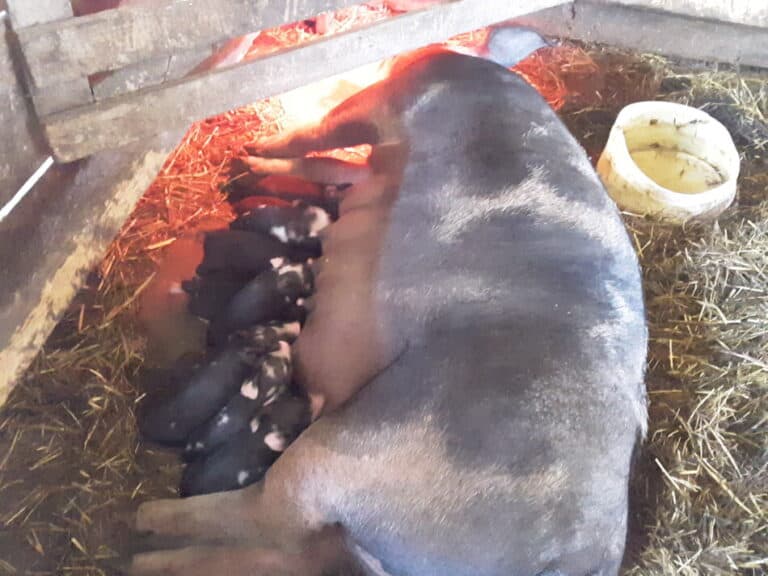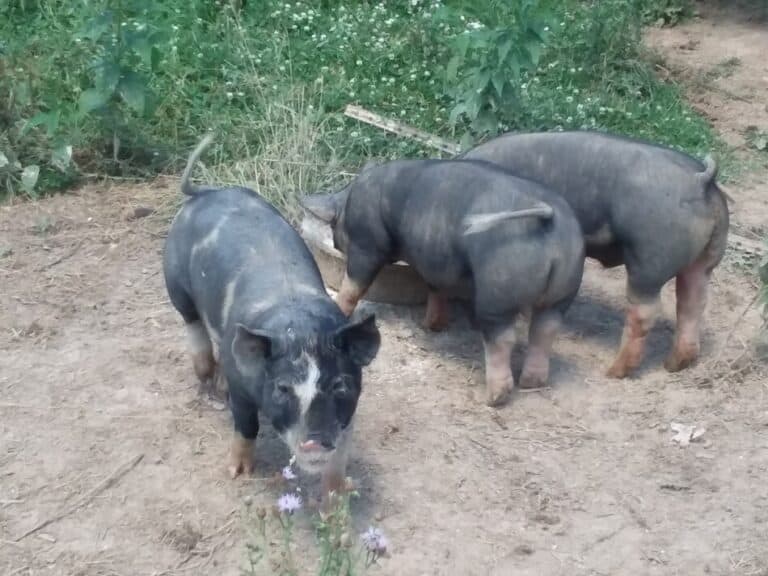Are Pigs Dangerous To Raise?
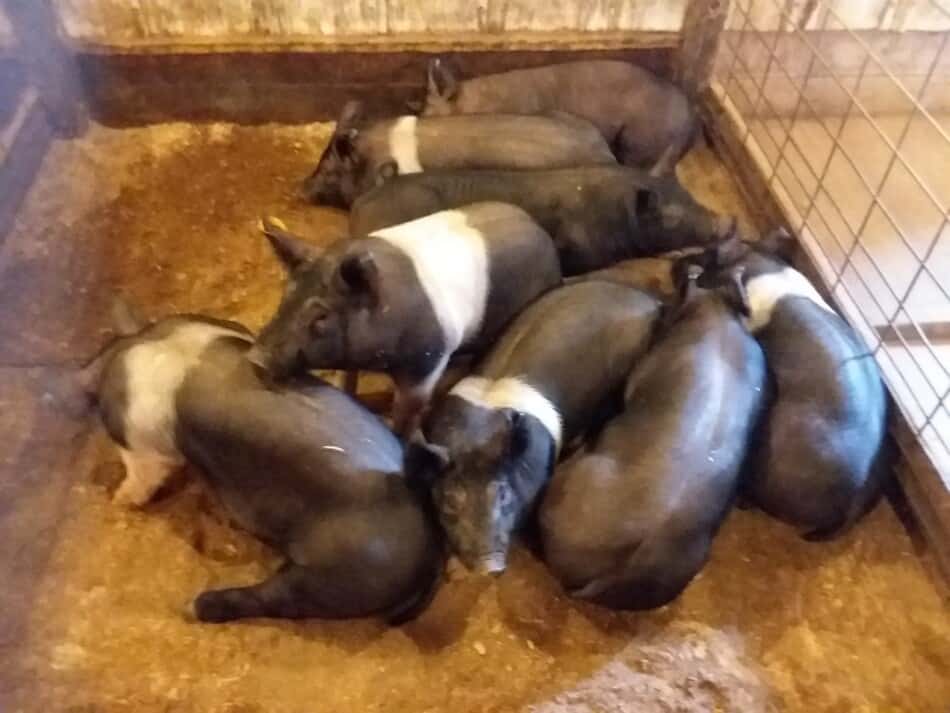
Maybe you’ve heard a news story about pigs or a thought happened to cross your mind that has you wondering: are pigs safe or dangerous to raise?
Most domestic pigs are not dangerous. In certain situations, like a sow protecting her piglets, the sow can be aggressive, but overall, domestic pigs are as safe to be around as other livestock.
Overall, domestic pigs are not dangerous, but they do have some behavioral traits that you should be aware of before you decide to raise them.
| Domestic pig age/size | Behavior | Behavior description |
| All pigs | pushing | pushing and shoving is normal, all age pig behavior pigs can push each other and you when you are in the pen the bigger the pig, the more force behind the push |
| All pigs | darting past you | pigs can quickly dart past you and bump you sideways or knock you off your feet, causing you to hit the ground or hit another object, like a gate or wall |
| Feeder pigs | nipping | young pigs can nip your pants and shoes, like a puppy |
| Sows | defending piglets | a sow may fiercely defend her litter, some sows are calmer none like you messing with their piglets |
| Boars | fighting | boars have tusks (very sharp teeth) that they use to fight with the tusks can easily cut other boars, sows and you |
Pigs are not dangerous to raise
Most domestic pigs are not dangerous to be around or to raise for meat.
Pigs you would be raising for meat, called feeder pigs, are younger animals that would be much smaller than adult pigs.
Feeder pigs are 45-60 pounds when you get them and 280-300 pounds when you process them. 280-300 pounds may seem big to you, but in pig world that is still only about half of adult pig weight!
Since feeder pigs are younger and smaller, they are easier to handle and much less likely to be people aggressive. If aggression shows up, it’s usually in the adult breeding stock, not the feeders.
Being around pigs, like all livestock, has at least a minimal level of risk involved. Pigs can knock you down or step on your feet, just as a pony or cow could, but that does not make them dangerous.
Is Raising Pigs For Meat Worth It? is an article I wrote that will help you figure out how to plan the cost to feed your pigs and if it is more economical for you to raise them yourself or buy from someone else.
Happy pigs are not aggressive towards people
Pigs that are happy are not aggressive towards people, at all!
My pigs come right up to the edge of the pen when they see me because they are excited about being fed. It’s a lot like a dog wanting food or a treat.
If I’m in the pen with them, they occasionally bump into me, but it’s not aggressiveness. It’s usually jockeying for position amongst the other pigs to get to the new straw, hay or snack I gave them.
Happy pigs are fulfilled and easy to get along with
How do you keep your pigs happy? Raise them in a way that is fulfilling to them. What do I mean by that? Keep them busy and comfortable. It’s really that easy.
Make sure your pigs have plenty of space to exercise and root. Even if you are raising them in a pen, they still need to root.
Be creative here. Do you have a wood chip pile that the pigs could be penned in with? Or put them out in a section of the yard you rarely use, they’ll dig out all of the grubs.
Do you have a barn space that needs cleaned out from keeping animals there over winter? Put the pigs there and let them ruffle it up. This is what we do.
I keep my pigs in barn spaces that need to be rooted through, like where we feed the market lambs for part of the winter. The pigs root up the bedding, looking for treats.
They turn a hard to clean out area into great compost, all with very little additional work from me. Nice!
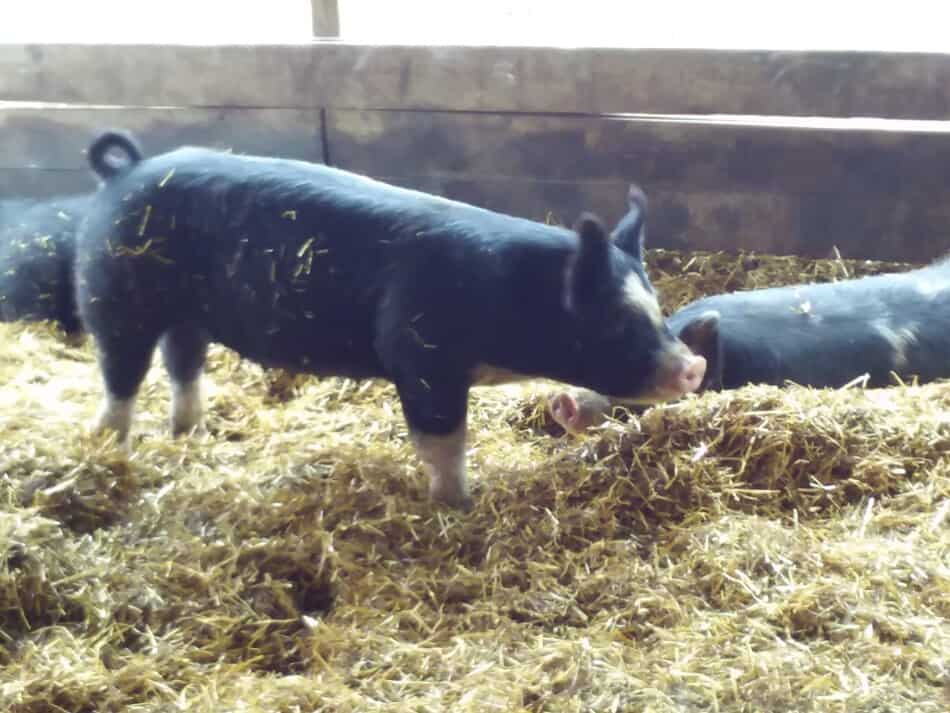
Frustrated pigs will live stressful lives and be harder to work with
Frustrated pigs will be more stressed and could be overreactive and harder to work with. This is not the fault of the pigs, it is the environment in which they are being raised.
Pigs that have room to run and play in (including rooting) and plenty of food and water are not stressed so will not be overreactive.
This means that if you want your pigs to be happy and nice to you, be nice to them by giving them a fun place to live, including exercise and rooting areas.
How Much Space Do Pigs Need? is an article I wrote showing square footages for your pigs, including a pen set up diagram.
Pigs need to be treated like livestock, not pets
Pigs need to be treated like other livestock, not like pets.
I think a big source of confusion that first time pig raisers have is they don’t quite know how to interact with animals that are not pets.
All you need is more experience. Livestock husbandry skills only come through experience! Until you get the skills, pigs can be frustrating.
This frustration can sound like the new pig raiser saying “what’s wrong with this pig that it’s behaving like this” and an experienced person’s answer is “nothing, it’s just being a pig, this is normal.”
Don’t worry, you’ll learn as you go.
Pigs are bigger than your pets so you need to handle them differently
Additionally, most pets are smaller than the pigs, even when you first get your feeder pigs.
It can be hard to figure out how to do things like move the pigs, when you are used to a picking up a cat or putting a leash on your dog to get them to move.
A leash trained pig would be handy sometimes, I’ll admit, but don’t count on it! It takes a different approach and an adjustment in your thinking to work with livestock.
It’s not hard and if you take your time, you’ll get it.
Attitude is genetic, buy pigs with good attitudes
Mean pigs raise mean pigs, attitude is genetic. Don’t buy your pigs from someone who talks about how poor the attitude of his or her pigs are!
One of the best ways to avoid having problems with your pigs is to buy pigs that have a good attitude to begin with. You can tell the likely attitude of the piglets by the attitude of the parents.
Buy pigs from a breeder that values good attitudes in breeding stock
Attitude is genetic, buy piglets from parent stock that has a good attitude and is handled daily by the breeder. Small farmers are great at this!
You are looking for a hands on pig breeder who spends time with the pigs.
Why does this matter? Easy, if the pigs have a bad attitude they are sold. A small scale pig breeder is less likely to keep pigs with a bad attitude.
A small farmer, with limited space for the pig breeding stock and limited time to dedicate to the pigs, will only keep pigs that are easy to work with and have good attitudes.
I’d like to say it’s pigs per litter or looks or something else more production based but it’s not, anything with a bad attitude gets sold, period.
There are plenty of pigs out there with good attitudes, so there is no need to deal with pigs that have poor attitudes.
Most pigs are no more risky than a pony
Being around pigs, like any animal, involves some potential for harm, but overall, raising pigs is not any greater of a safety risk than keeping a pony or a cow.
I must point out that your pigs could knock you down, just like a pony could. This is simply due to size.
When your dog bumps into you, you notice but probably don’t fall. If your pony stepped sideways quickly and bumped into you, you might fall.
Not because the pony is mean, because the pony weighs more than you.
It’s the same with pigs, the bigger they get the more bulk they have, just like a pony.
I should tell you that pigs also tend to use their mouths to discover, kind of like a puppy. This means that your feeder pigs are likely to nip at your pants.
They are not being mean, they are just curious, like a puppy.
I have all of these risks listed out in the table at the beginning of the article, if you haven’t checked it out already.
At certain times, adult pigs can hurt you
Adult pigs can hurt you, specifically sows with piglets and boars with tusks. Adult pigs could, due to their size, also accidentally hurt you by knocking into you.
Adult pigs are a different story. Most of the time they are not mean, unless you have started out with pigs that genetically have a poor attitude! If that’s the case, sell them and get something small farmer friendly.
Mature boars have sharp tusks
As boars age, they naturally grow two tusks, which are very sharp teeth. These tusks can cut you and other pigs.
Keep a smaller boar and sell him before the tusks grow out or use A.I. for your breeding needs so you don’t need a boar, at all.
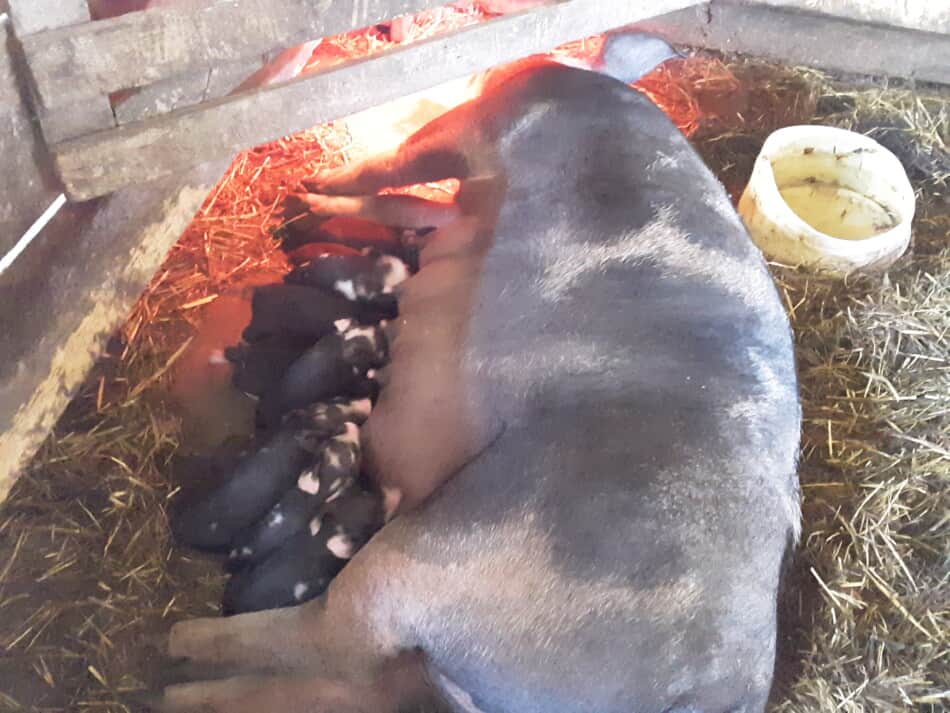
Sows can be very protective of their piglets
Sows that have a good attitude, generally, are still going to be very touchy when they have piglets. When her babies squeal, she is very concerned about what made that happen. If it’s you, you’re in trouble.
Stay out of the sow’s area for a few days to a week, until she gets settled in. Feed her and water her, of course, but don’t be loud and definitely don’t mess with the piglets! Give her some peace and quiet.
My sows are nice to be around and work with, overall, but right after farrowing I stay out of their pen and keep things around them quiet for the first few days to make sure the litter gets off to a good start and the sow stays calm.
The easy way to get around this is to not mess with the piglets until they are weaned. This way you don’t risk making the mom mad and more importantly worried about you, each time you show up.
Leave the piglets alone until weaning.
We had a sow get mean. We were raising her for a friend and she was very aggressive towards us once she had her babies. This was unacceptable behavior, so she’s gone.
Wild pigs are dangerous, domestic pigs are not
Wild pigs are completely different in their attitude towards humans than are domestic pigs. Think about it, it’s like the difference between dogs and wolves or coyotes.
Domestic pigs know that when you show up they get food and pigs are all about food! My pigs are happy to see me because I’m their lunch lady!
Wild pigs learn that when you show up bad things happen, they might get scared or just negatively react to something unexpectedly showing up (that’s you) on their turf.
I know there are articles about pigs eating people and I’m sure they are true, but they are also rare compared to the number of pigs in the U.S. right now.
In 2021, the United States was home to approximately 74.77 million hogs and pigs. Apr 20, 2021
• Total number of hogs and pigs in the U.S., 2021 | Statista
https://www.statista.com › Agriculture › Farming
To make this number, the 74.77 million hogs and pigs, make more sense, consider this: your chances of getting struck by lightening are 1 in 500,000.
Lightning is one of the leading causes of weather-related fatalities. But the odds of being struck by lightning in a given year are only around 1 in 500,000.
Of course, you should be aware that pigs are capable animals, but going with the stats alone, you shouldn’t be overly worried about them eating you!
While we are on the subject, check out this Washington Post article giving the stats on the various animal attacks that are likely to happen to you.
It includes sharks, alligators, venomous snakes and lizards, bugs, cows and dogs. There is no separate category for pigs. Pigs are in there, but they are lumped in with other mammals.
